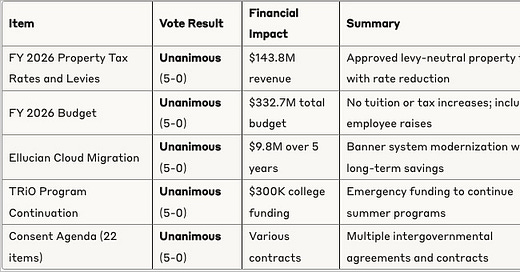💰 Pima Community College Freezes Tuition and Taxes While Enrollment Soars to 13-Year High
🏛️ 48-Hour Federal Grant Cancellation Triggers $300K Emergency Response at Pima College. Board unanimously funds TRiO programs after Department of Education pulls plug on student support.
😽 Keepin’ It Simple Summary for Younger Readers
👧🏾✊🏾👦🏾
🏫💡 Pima Community College just proved that schools can be smart with money while still helping students succeed. The college leaders had to figure out how to spend 💰 $41 million less than last year, but instead of cutting important programs or making students pay more, they found creative solutions. They're getting more money because new houses 🏠 and businesses🏢 are being built in the area, and they finished some big construction projects that were costing a lot.
The best part? 🎉 More students are choosing Pima than ever before - they have the most summer students since 2012! The college is also upgrading their computer systems to be more modern and efficient, kind of like trading in an old flip phone 📞 for a smartphone 📱.
When the federal government suddenly stopped funding some programs that help high school students prepare for college, the board immediately found $300,000 💸 to keep those programs running because they didn't want to let those kids down. 🙌👩🎓👨🎓
🗝️ Takeaways
💵 Zero tuition increases - Students pay the same rates as last year despite inflation
🏠 Property tax rates actually decreased - Down 2.8% while maintaining services
📈 Enrollment hits 13-year summer high - 9,778 students, up 1,000 from last year
💻 $9.8M technology modernization approved - 30-year-old Banner system moving to cloud
🎯 $300K emergency funding - College steps in after federal TRiO grants cancelled
👥 Employee raises guaranteed - 1% minimum plus market adjustments for all staff
🏆 Unanimous board approval - All five elected members voted yes on every major item
🌟 Fourth-lowest property taxes statewide - Maintaining competitive advantage for economic development
Keeping Education Affordable: Pima Community College Approves Budget with No Tuition or Tax Increases
A detailed analysis of the June 9, 2025, Pima Community College Governing Board meeting
The Pima Community College Governing Board has unanimously approved the College's budget for Fiscal Year 2025-2026, reaffirming its commitment to affordability, fiscal responsibility, and student success. The adopted $332.7 million budget includes no increase to tuition and no increase to the property tax levy, despite continued financial uncertainty across the higher education landscape.
According to the official press release, the College's ability to maintain stable costs is attributed to "conservative, forward-looking financial planning and steady enrollment and population growth."
PCC will generate approximately $2.8 million in additional revenue from new construction and property development while lowering its primary property tax rate from $1.2530 to $1.2176 per $100 of assessed valuation.
The Pima Community College Governing Board met on June 9, 2025, for this pivotal budget approval session that would shape the institution's direction for fiscal year 2025-2026. In an era of economic uncertainty and rising educational costs, the board's unanimous decisions reflected a commitment to affordability and fiscal responsibility while maintaining educational quality.
Speakers and Their Messages
Chair Greg Taylor
Board Chair Taylor served as the meeting's moderator, demonstrating strong leadership throughout the session. As quoted in the press release, Taylor emphasized the significance of the unanimous decision:
"We are proud to unanimously adopt a fiscally responsible budget that sustains quality while honoring the financial realities of our students, families, and community. We're not raising tuition. We're not raising the tax rate. And thanks to this administration's careful planning, we're continuing to invest in innovation, support, and student success. This is not just a sound financial decision, it's a reflection of who we are as a community college."
During the meeting, his opening remarks emphasized the college's commitment to stability during uncertain times, stating:
"My vote to approve this budget is really about stability. It's about you know we're in a time of incredible disruption of uncertainty of instability and so for us to be able to say we will continue to provide the same level of service which is what we're saying but we're also going to do it in a way that doesn't add to that instability."
Chancellor Dr. Jeffrey P. Nasse
Chancellor Nasse delivered comprehensive updates on the college's achievements and future direction. As quoted in the official press release, he stated:
"We are proud to deliver a budget that prioritizes student success. And, importantly, holds the line on tuition and taxes. This budget reflects our shared commitment to delivering the highest quality education at an exceptional value to the people of Southern Arizona."
He proudly announced significant milestones: successful HLC accreditation reaffirmation, enrollment growth over the past 2.5 years, and summer enrollment reaching levels not seen since 2012 (9,778 students, up from approximately 8,778 the previous year). During the meeting, he emphasized the college's impressive trajectory:
"We had a goal to increase our enrollment in the spring, and we accomplished that. We are now in the summer, right now, as I looked at that report, we have 9,778 students enrolled in the summer, that's a thousand more than last year, but we have not had that many students enrolled in the summer at Pima Community College since 2012."
Vice Chancellor Dr. David Bea
Dr. Bea presented the budget details with remarkable transparency, explaining how the college achieved a balanced budget without tax or tuition increases. His presentation highlighted the budget's reduction from $373.8 million to $332.7 million, primarily due to the completion of major capital projects. During his presentation, he explained:
"We have held true to the board's direction to develop a budget that doesn't have an increase in tuition and service fee rates for the upcoming year. And it also has a levy-neutral property tax rate. That is to say that there's no tax increase. The only additional tax revenues we're receiving this upcoming year will be from additional new properties that got added to the tax rolls."
He also emphasized the college's competitive position:
"Relative to our peers, Pima County, the college has relatively low property taxes. Property tax rates were the fourth lowest in the state. We're very cognizant of that, making sure that we're providing a great value to our community."
Michael Geiman, Chamber of Southern Arizona Chief Advocacy Officer
Geiman's public comment praised the budget's competitiveness in regional economic development. He stated:
"I'm really here simply to acknowledge and thank the board for this budget putting together this budget that not only addresses the goals and mission of the college but also does it without raising taxes without raising fees and without raising other components to craft this budget."
He emphasized the college's role in workforce development and mentioned the mysterious "Project Blue":
"We have a big project coming up, Project Blue, and this could significantly increase the property tax base here in our region... this project alone would significantly increase that base so that community college, county, other jurisdictions can benefit from that increase in property tax."
Makyla Hayes, Faculty Representative

Hayes delivered thoughtful remarks about the current political climate and the college's response to it. She stated:
"I heard a comment today that said basically everything is political. Even if somebody says they don't want to be political, that in itself is a political statement."
She appreciated the administration's measured approach:
"I'm really appreciative that Pima hasn't complied in advance. We've waited and we've seen what's going on. We're not making rash decisions, and I hope we can continue to do so."
Regarding preparing students for the future, she observed:
"My kid's generation, their jobs may not have even been created yet, and they're probably gonna change every three to five years, much less three to five times. They're gonna be doing a lot. We don't know where they're going. So we wanna make sure that while we're preparing them for current industry needs, we're also preparing them to be adaptable, to change and to grow and to learn how to learn and be a productive society member."
Denise Riley, Faculty Senate President
Riley represented approximately 270 full-time faculty and 750 adjunct faculty members. She outlined three key faculty goals and praised recent improvements:
"I wanna acknowledge board member Riel for trying to tackle this over a year ago, starting that process there. And then I also wanna acknowledge Dr. Nasse for his support in this governance model and really talking about this regularly and openly with faculty."
She emphasized the importance of planning in education:
"Any good teacher, any great teacher or good teacher really recognizes that it's all in the planning. So the more that you plan for the lesson, the better the student outcomes will be."
Board Members' Diverse Perspectives
Board Member Riel: Shared personal experiences with COVID-19's impact. She praised both graduation ceremonies and acknowledged her decision to withdraw from the city council race to continue serving the college.
Board Member Barraza: Highlighted the emotional impact of graduation ceremonies: "I had been told that graduations were one of the best parts of serving on the governing board, and I have to say I was deeply moved both by the commencement in May and Thursday's high school equivalency diploma graduation. It was very moving to hear the student's stories."
Board Member Randall: Emphasized the value of Super Saturday programs: "I went to the last one, the next one is August 2nd, but I went to this previous Saturday with my kid, and we had a really great time, so it was very personal. I think I've been in those shoes before, you know, feeling maybe not quite worthy of an education if you've maybe had a few false starts."
Vice Chair Bernal Morales: Shared deeply personal stories: "During the graduation, I had the pleasure and privilege to hand a congratulations and a hug to young ladies that I supported when they were 13 years old... I had the pleasure of congratulating two of them as they got their Pima Community College graduation ceremony certificate."
Administrative Presentations
Dr. Aubrey Conover and Makyla Hayes (AERC): Detailed the All Employee Representative Council's collaborative approach to policy development, having addressed 89 resolution teams since August 2022
Marcy Euler (Foundation President): Reported the foundation's growth from $7.8 million to $15.8 million in assets, with $9.5 million in direct support provided to the college
Isaac (IT Specialist): Presented the complex Ellucian cloud migration project, emphasizing both technological benefits and financial advantages
Key Agenda Topics and Discussions
Budget Approval: A Model of Fiscal Responsibility
The centerpiece of the meeting was the approval of the fiscal year 2025-2026 budget. This $332.7 million budget represents a significant reduction from the current year's $373.8 million, primarily due to the completion of major capital projects.
The press release notes that "the adopted budget includes a 1% minimum raise for regular employees, a 3% increase for adjunct faculty pay, and pay increases tied to years of service and market-based adjustments for certain positions." As Dr. Bea explained during the meeting:
"We have increases moderate in total increases to employees salaries and wages. Those are based on our classification and compensation structure. That includes providing a year of experience for employees for the experience that they've added since they've been at the college in their position."
Board Member Riel commented on the tax decision context:
"We raised taxes two years ago, and my property tax went up, I think it was like $12.96 for the year, and I was fine with paying that because I value education. I think the reason that we decided we didn't want to do a property tax increase this year is because we want to see if Pima College can be more efficient with the monies that we have."
Technology Infrastructure Modernization
Isaac presented the Ellucian cloud migration project, a $9.8 million, five-year initiative aimed at modernizing the college's Enterprise Resource Planning system (Banner). This 30-year-old system supports all student records, financial operations, and administrative functions.
Project Benefits:
Elimination of 57 on-campus servers (20% of physical infrastructure)
Annual savings beginning in year 3 ($100,000) and increasing to $600,000 by year 5
9-year payback period with $1.3 million in total savings over 10 years
Access to AI-powered student success tools and modern workflow capabilities
TRiO Grant Crisis and College Response
In a concerning development, the Department of Education discontinued two TRiO upward bound grants with only 48 hours’ notice, affecting nearly 100 high school students from low-income, first-generation families. Chancellor Nasse explained the situation:
"A couple of weeks ago, we received notification from the Department of Education that two of the Trio grants, upward bound grants, one at the Northwest, one of the downtown campus would be discontinued from the Department of Education and discontinued within 48 hours."
Chair Taylor provided context for the board's decision to step in:
"When we received notice from the U.S. Department of Education that the Upward Bound programs at Northwest and the downtown campus would not be continued, it was only days before they were about to begin. So, there was not any notice to be able to prepare, especially when you consider that we already had almost 100 students that were signed up to participate in those programs."
The board unanimously approved $300,000 in college funding to continue these critical summer programs, demonstrating a commitment to educational access despite federal funding cuts.
Employee Relations and Shared Governance
The All Employee Representative Council (AERC) presentation highlighted the college's collaborative approach to policy development. Since implementing their current system, they've successfully addressed 89 policy resolution teams, with only 25 currently active.
Notable AERC Achievements:
Temporary staff instructor pay equity resolution
Hard-to-hire framework development
Staff salary scale transparency tools
Grading deadline standardization
Votes and Outcomes
Note: All votes were conducted via roll call as required by state law for budget items
Significant Contract Approvals
The consent agenda included numerous important agreements:
Santa Cruz County Partnership: $11.4 million over 5 years for workforce education
Various Clinical Partnerships: Veterans Affairs, University of Arizona collaborations
Insurance Renewals: Maintaining comprehensive coverage for college operations
Infrastructure Projects: HVAC upgrades, parking lot resurfacing, building maintenance
Community Impact and Financial Responsibility
Enrollment Success Story
According to the press release, enrollment at PCC continues to increase, with "the number of students up 4% this past spring and an 11% increase in the current summer session. The College has now experienced enrollment growth every semester for the past two and a half years, reflecting strong demand for PCC's programs and support services."
Chancellor Nasse reported remarkable enrollment growth during the meeting:
"We had a goal to increase our enrollment in the spring, and we accomplished that. We are now in the summer, right now, as I looked at that report, we have 9,778 students enrolled in the summer, that's a thousand more than last year, but we have not had that many students enrolled in the summer at Pima Community College since 2012."
Economic Development Partnership
Michael Geiman's comments highlighted the college's role in regional economic development. With property tax rates being the fourth-lowest in Arizona, PCC maintains competitive advantages while supporting workforce development initiatives crucial to attracting new businesses.
Student Success Achievements
The college awarded 5,983 degrees and certificates, including:
Over 150 nursing graduates
1,200 transfer degree recipients
Notable scholarship winner: Melissa Shaw, recipient of the prestigious Jack Kent Cook transfer scholarship ($55,000+ annually)
Looking Forward: Innovation and Sustainability
Technology Integration Plans
Chancellor Nasse outlined ambitious plans for integrating AI in instruction and student services, supporting faculty development in digital fluency, and expanding online offerings to meet the diverse needs of students.
Facilities and Safety Improvements
Future initiatives include:
Consolidating underutilized spaces for efficiency
Planning a centralized public safety center
Investing in IT modernization and deferred maintenance
Enhancing student-facing services across all campuses
Workforce Development Focus
The college plans to deepen its industry partnerships in manufacturing, healthcare, public safety, IT, and cybersecurity, while launching new baccalaureate degrees and expanding its centers of excellence.
Challenges and Resilience
Federal Funding Uncertainty
The TRiO grant situation exemplifies broader concerns about federal education funding. Board Member Riel noted that the college has approximately $64 million in grants and contracts, making federal policy changes a significant concern for future operations.
Political Climate Considerations
Faculty representative Hayes addressed the challenging political environment, praising the college's measured response to federal changes and emphasis on maintaining core values of open access and affordability.
Get Involved: Your Voice Matters
Pima Community College's success depends on active community engagement. The governing board meetings demonstrate transparent decision-making and welcome public participation.
How to Participate:
Attend board meetings: Next meeting September 10, 2025, at 5:30 PM
Submit public comments: Email pcc-boardstaff@pima.edu or register to speak
Follow board activities: Watch live streams on PCCTV YouTube channel
Engage with programs: Explore educational opportunities at your local PCC campus
Stay Connected:
Board meetings are held monthly during the academic year
Executive sessions begin at 3:30 PM, public sessions at 5:30 PM
All meetings are hybrid (in-person and virtual participation available)
Agendas and minutes are available on the college website
The June 9th meeting showcased a governing board committed to fiscal responsibility, educational access, and community partnership. In times of uncertainty, PCC continues to prioritize student success while maintaining affordability—a balance increasingly rare in higher education.
Questions for Community Reflection:
Given the federal government's sudden cancellation of TRiO grants with just 48 hours’ notice, how should community colleges balance reliance on federal funding with local sustainability, and what role should local taxpayers play in supporting educational access programs?
As PCC invests $9.8 million in cloud technology modernization while maintaining the fourth-lowest property tax rate in Arizona, what strategies should community colleges employ to fund innovation and infrastructure improvements without burdening students or taxpayers?
Your thoughts and engagement help shape the future of community education in Southern Arizona. Join the conversation and help build a stronger, more educated community.
Have a scoop or a story you want us to follow up on? Send us a message!









Wow
Very good idea. I don't have the money yet to go there and ineligible for loans